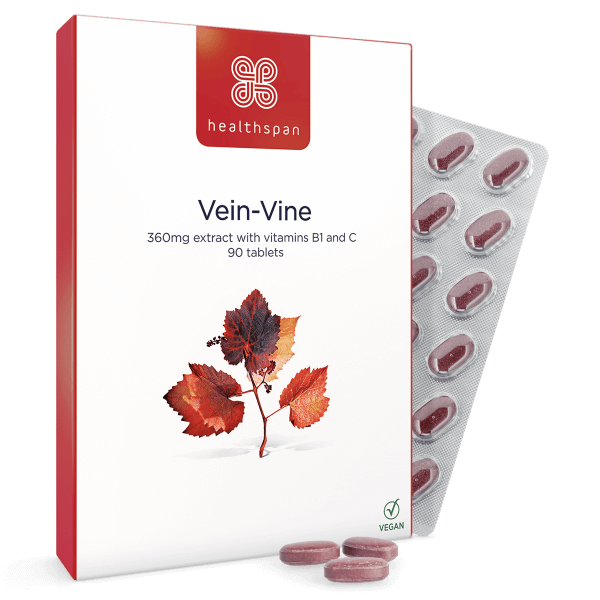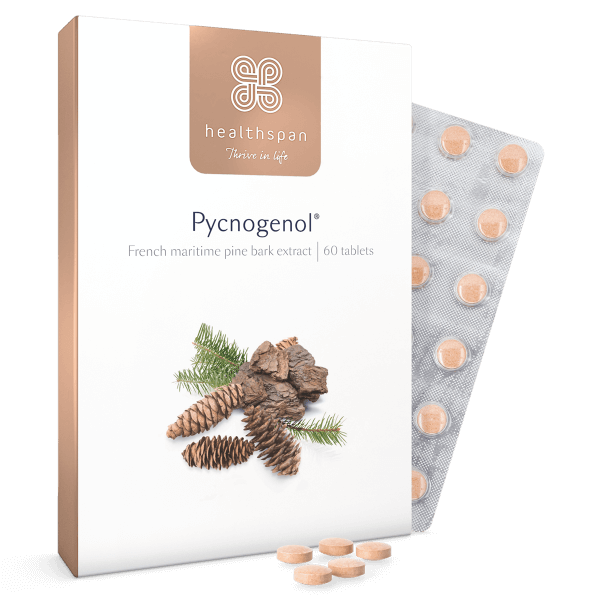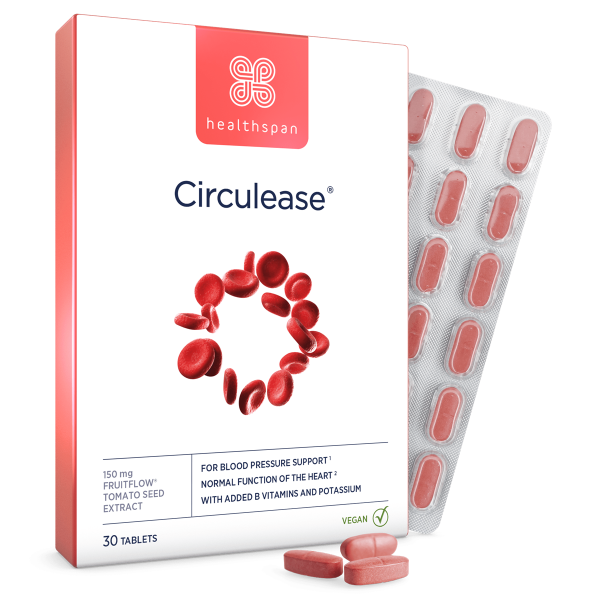Poor circulation can cause a number of problems, but you don't have to suffer needlessly. Here are the top supplements to improve blood circulation.
🕒 6 min read
Your circulation consists of the heart and blood vessels, which together are known as the cardiovascular system.
Arteries carry blood away from the heart and have thick, elastic walls to cope with pulsating blood under high pressure. Large arteries branch and divide into a series of smaller arterioles that are less elastic and provide more resistance to blood flow. It is this resistance, against which your heart has to pump, that helps to maintain the blood pressure within your circulation.
Arterioles in turn connect to capillaries: tiny vessels with thin walls that allow oxygen and nutrients to pass into tissues, while absorbing excess fluid and soluble wastes from your tissues back into the blood.
Capillaries are connected to small veins called venules, which feed into larger veins that carry blood back to the heart. These larger veins have relatively thin walls as, unlike arteries, the blood pressure within them is lower.
Poor circulation
A poor circulation is linked with a number of common, painful problems, including chilblains, Raynaud's syndrome (in which cold causes small arteries in the fingers and toes to go into spasm), muscle cramps, varicose veins and peripheral arterial disease due to hardening and narrowing of the arteries.
The latter causes poor blood flow to the lower limbs on exercise, and can result in intermittent claudication – pain in the calf muscles that typically comes on during exercise and improves on rest. In severe cases, poor arterial or venous blood flow can lead to the development of leg ulcers.
If you have poor circulation, the following supplements may help.
Red vine leaf extracts
Red vine leaves are rich in antioxidant polyphenols that help to stabilise the lining of tiny capillaries and reduce their permeability. This makes capillaries less leaky, so less fluid passes from the circulation into the tissues to cause swelling of the ankles (oedema).
Red vine leaf extracts are also helpful for chronic venous insufficiency, in which the leg veins and their valves do not work properly. This makes it difficult for blood to return from the legs to the heart (against the pull of gravity), so blood pools in the lower legs. If the leg vein valves collapse, then varicose veins result.
Symptoms of chronic venous insufficiency include feelings of heaviness, aching legs, swelling of the ankles or calves, sensations of tension in the legs, and pain. The overlying skin may become dry and discoloured.
In a study involving 248 people with moderate-to-severe chronic venous insufficiency, half took red vine leaf extracts for 12 weeks and half were given a placebo. Those taking the red vine leaf extract had significantly reduced lower limb swelling and decreased leg pain. Other studies also show reductions in calf swelling, sensations of heaviness, and pain from taking red vine leaf extracts.

Vein-Vine
5,400mg Red Vine Leaf for tired and heavy legs
- Red vine leaf contributes to good blood flow in the legs
- Can reduce the feeling of tired and heavy legs
- Added Vitamin C to help collagen formation for normal blood vessel function
Pycnogenol
Pycnogenol is a rich blend of antioxidants extracted from the bark of French maritime pine trees. It is used to improve circulation and reduce ankle swelling by improving vein elasticity and decreasing their stretching and swelling.
Pycnogenol helps to strengthen fragile capillaries and reduce swelling in people with varicose veins, and those experiencing swelling as a side effect of antihypertensive medication.
It has also been shown to reduce abnormal blood clotting, even in smokers, in a similar way to aspirin but without the increased risk of stomach bleeding that can occur.
Pycnogenol has been found to reduce cramp and muscular pain as a result of reduced blood flow to the legs. It has also been used to promote the healing of venous ulcers and to improve arterial blood flow in people with coronary heart disease. It is a popular supplement for reducing ankle swelling and the risk of deep vein thrombosis (DVT) during long flights.

Pycnogenol®
Naturally powerful French maritime pine bark extract
- Unique blend of natural bioflavonoids
- Find out more at Pycnogenol.com
Circulease, containing Fruitflow tomato extract
Circulease contains Fruitflow® – an extract of the yellow jelly that surrounds tomato seeds. It's a substance that regulates the stickiness of your blood's platelets, enabling it to clot in response to an injury, while preventing it from getting so sticky that it poses a risk to your circulatory system.
A Mediterranean-style diet has long been associated with better heart health, and a link with tomato consumption has been suggested. However, it would be impossible to get enough of this healthy substance from tomatoes alone, as you'd need to eat a huge amount to see much benefit.
The Fruitflow in Circulease delivers a highly concentrated extract of this tomato jelly, providing over 30 known anti-platelet compounds to promote healthy blood flow and reduce stress on your cardiovascular system.
Although it works in a similar way to a 75g dose of aspirin, in terms of thinning the blood to prevent clots, Fruitflow has none of aspirin's side effects, which can include excessive bleeding. Circulease is therefore safer to take every day.

Circulease®
Provides natural support for a healthy blood flow and cardiac function
- Advanced formulation containing Fruitflow®
- Supports normal red blood cell formation
- Helps maintain normal blood pressure
Ginkgo biloba
Ginkgo extracts are another source of unique antioxidants that can improve circulation. They help to relax blood vessel walls, reduce blood stickiness and increase red blood cell flexibility. By improving blood flow to the peripheries, Ginkgo helps to overcome poor circulation, chilblains, Raynaud's disease and erectile dysfunction.
In one study, taking standardised extracts for 10 weeks reduced the number of attacks of Raynaud's syndrome by 56%, compared with 27% in those taking placebo.
In people with coronary heart disease, it may also help to increase blood flow through the coronary arteries.
Ubiquinol
Ubiquinol is the 'body-ready' form of coenzyme Q10, a substance needed for energy production in cells. It is especially helpful for improving oxygen processing in cells when circulation is poor.
The amount of ubiquinol your cells make peaks around the age of 20 years, and then reduces with age. At the same time, your ability to absorb coenzyme Q10 from food reduces, and your ability to convert ubiquinone into biologically active ubiquinol diminishes at a faster rate after the age of 50. This is one possible underlying cause of poor heart muscle function.
People with heart failure (inefficient pumping of the heart) appear to have lower ubiquinol levels than those without, and those with the most severe disease have the lowest levels of coenzyme Q10.
Studies suggest that ubiquinol can improve muscle strength and the amount of blood pumped out with each heartbeat (ejection fraction). As ubiquinol can help to improve heart function, it is increasingly recommended by cardiologists as part of medical treatment regimes, but check with your specialist before taking it.
Garlic
Garlic is a source of powerful antioxidants, such as allicin, which have beneficial effects on the circulation. Garlic tablets help to dilate small arteries, and was found to increase blood circulation through skin capillaries by as much as 55% compared with placebo.
Taking garlic supplements also improves the elasticity of blood vessel walls, and has a blood-thinning action to improve blood flow. As a result, garlic supplements can lower blood pressure by an average of 5.1/2.5 mmHg, according to 20 trials involving 970 people with hypertension.
Please note: always seek medical advice if you have persistent poor circulation, cramping or pain. If you are taking any prescribed medications, talk to your doctor before taking supplements, and check for any interactions.







